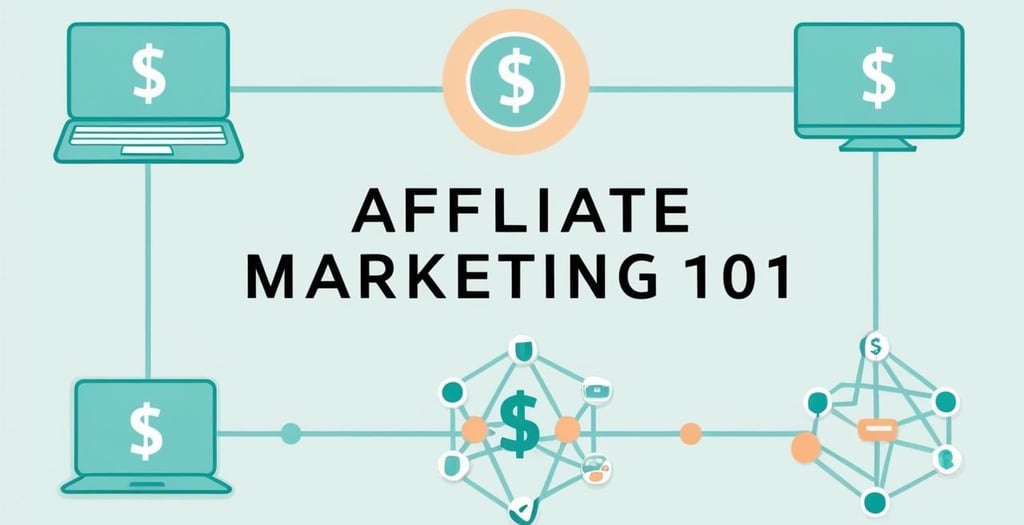Affiliate Marketing 101: What It Is and How to Get Started
Affiliate marketing is a great way to earn money online. You don't need a lot of money to get started and the income potential is high. Read on to learn more.
AFFILIATE MARKETING
9/6/20253 min read


Affiliate marketing is one of the most accessible ways to earn money online. Whether you're a stay-at-home parent, a student, or just looking for a side hustle, affiliate marketing can be a great starting point. This article will walk you through everything you need to know to get started—from the basics to your first steps.
What Is Affiliate Marketing?
At its core, affiliate marketing is a performance-based marketing strategy where you earn a commission for promoting someone else's product or service. You don't have to create the product, handle customer service, or manage inventory. Instead, you focus on driving traffic and encouraging people to make purchases through your unique affiliate link.
How Affiliate Marketing Works
Here’s a simple breakdown of how affiliate marketing works:
Join an affiliate program: Companies offer affiliate programs you can sign up for, such as Amazon Associates, ShareASale, or ClickBank.
Get your unique affiliate links: After joining a program, you get custom links that track your referrals.
Promote the products: Share these links through your blog, social media, email list, or YouTube channel.
Earn commissions: When someone clicks your link and makes a purchase, you earn a percentage of the sale.
Benefits of Affiliate Marketing
Low barrier to entry: No need for a product or upfront investment.
Passive income potential: Earn money while you sleep if your content continues to drive traffic.
Scalability: Start small and grow by adding more content and promotional channels.
Flexibility: Work from anywhere and choose the products or services that fit your interests.
Common Terms You Should Know
Affiliate Link: A unique URL that tracks your referral to a product or service.
Conversion Rate: The percentage of visitors who complete a desired action (like making a purchase).
Commission: The money you earn for each sale made through your affiliate link.
Cookie Duration: The length of time a referral is tracked after a user clicks your link (e.g., 24 hours, 30 days).
Choosing a Niche
Success in affiliate marketing often comes down to choosing the right niche. A niche is a specific segment of the market. Good niches have a mix of passion, demand, and profitability. Examples include:
Fitness and health
Personal finance
Travel
Tech and gadgets
Parenting
Finding Affiliate Programs
You can find affiliate programs in several ways:
Search Google: "[Your niche] + affiliate program"
Join affiliate networks: Sites like ShareASale, CJ Affiliate, and Impact allow you to find programs in one place.
Check product websites: Many companies list affiliate programs in the footer of their site.
Setting Up Your Platform
To promote affiliate products, you’ll need a platform. Here are the most common:
1. Blog/Website
Ideal for long-form content and SEO
Easy to control your branding
Use platforms like WordPress or Wix
2. YouTube Channel
Great for product reviews and tutorials
Builds trust through video
Free to start
3. Social Media
Instagram, Pinterest, and TikTok are popular
Best for visual products and lifestyle niches
4. Email List
High conversion rates
Good for nurturing your audience over time
Creating Content That Converts
Content is the engine of your affiliate business. You need content that educates, entertains, or solves a problem.
Types of Content to Consider:
Product reviews
Comparison posts
How-to guides
Listicles ("Top 10" posts)
Tutorials or case studies
Tips for Creating High-Converting Content:
Focus on solving real problems
Be honest and transparent
Use strong calls to action (CTAs)
Include images, videos, or infographics
Tracking and Optimizing Performance
Once you're up and running, track your performance to improve your strategy.
Tools to Use:
Google Analytics for website traffic
Affiliate dashboards for clicks and conversions
URL shorteners with tracking like Bit.ly
Key Metrics to Watch:
Click-through rate (CTR)
Conversion rate
Earnings per click (EPC)
Legal and Ethical Considerations
To stay compliant and build trust:
Disclose affiliate links: Use clear language like "I may earn a commission if you purchase through my link."
Avoid spammy tactics: Don’t mislead your audience.
Follow platform rules: Especially on YouTube and social media.
Common Beginner Mistakes to Avoid
Promoting too many unrelated products
Not focusing on your audience's needs
Ignoring SEO or content quality
Expecting fast results without consistent effort
Final Thoughts
Affiliate marketing is not a get-rich-quick scheme, but it's a real business model with serious income potential. With the right niche, good content, and smart promotion, you can build a steady stream of passive income. Start small, stay consistent, and learn as you go.
To learn more about Affiliate marketing, check out this FREE information video.
This post contains affiliate links, which means I may earn a small commission if you make a purchase at no extra cost to you.
